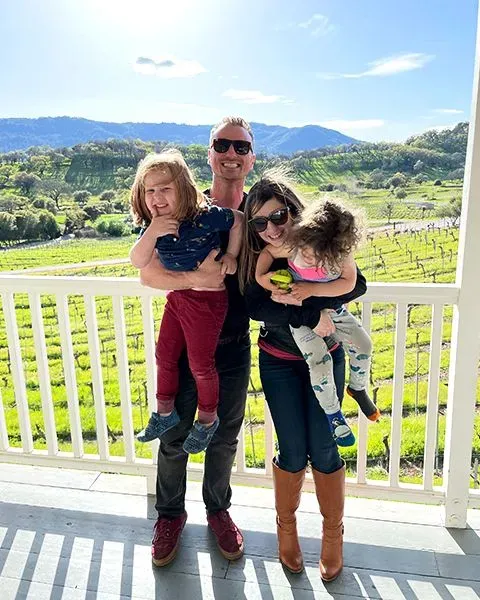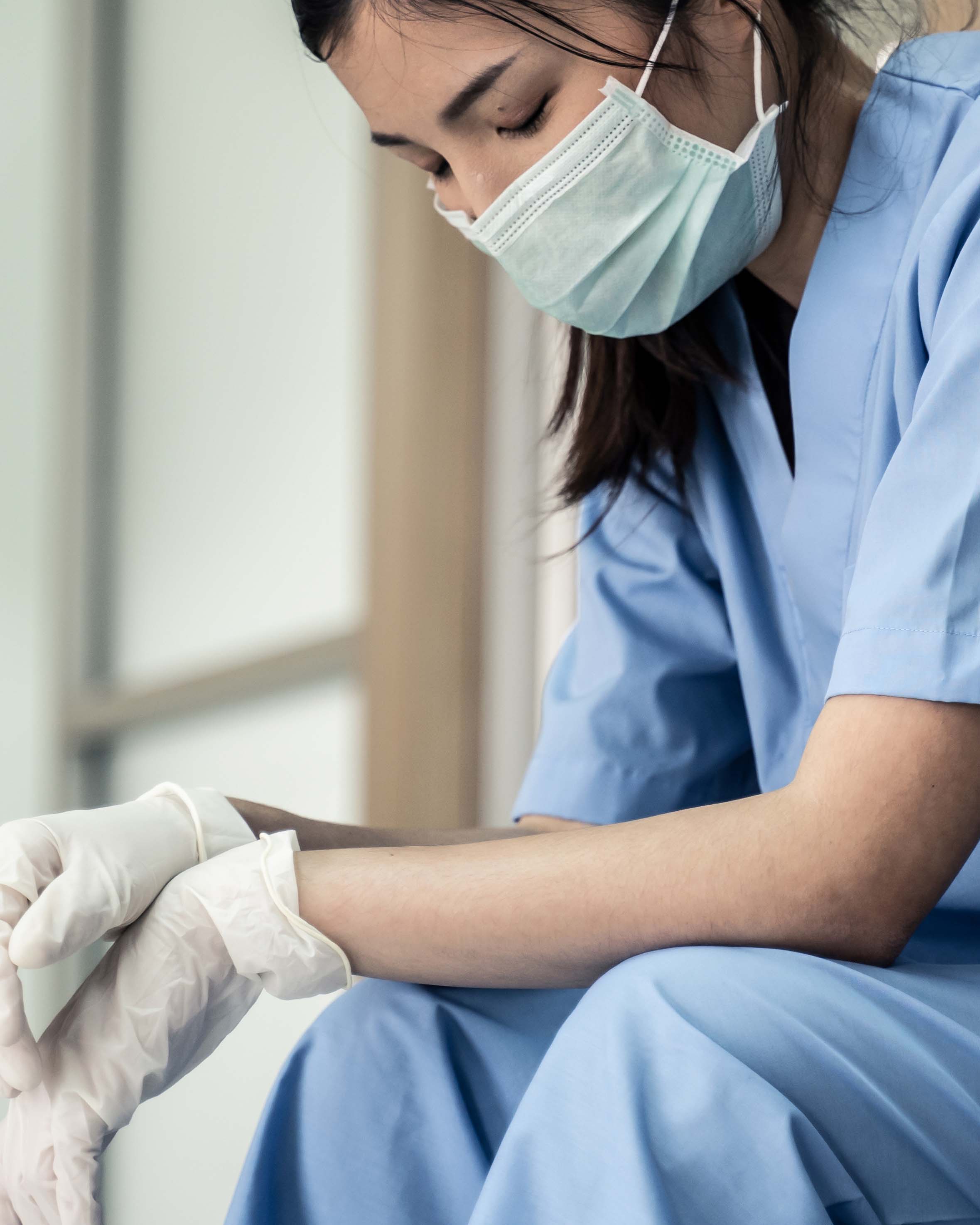
How 2020’s Challenges Transformed One Doctor’s Life
A Neuro-Oncologist reconnects with family and drives cross-country to find his dream job.
June 18, 2021
Dr. Kester Phillips has a mission in life that has eclipsed everything else — he wants to give people with cancer more time, and he wants to give them hope.
As a Neuro-Oncologist at Swedish health system in Seattle, he’s doing exactly that – treating patients with innovative medications and helping to dramatically improve survival rates.
Just a few years ago, in 2019, Dr. Phillips was working at a hospital in Virginia, feeling burned out and wondering how he could have worked hard his whole life to end up unfulfilled.
Then 2020 arrived, bringing with it a global pandemic and racial unrest. For Dr. Phillips, 2020 also brought clarity, causing him to pause and reassess what was truly important. It spurred him to mend fences and strengthen ties with his children. It also crystallized his decision to make a career change. He reached out to Provider Solutions & Development recruiter Cindy Corson about a position at the acclaimed Swedish Neuroscience Institute.
“Cindy was very transparent about this opportunity for growth. There was no reading between the lines,” Dr. Phillips says. “I felt safe and comfortable. She helped me through the entire process, and I was able to solidify this major change I was about to make.”
“I tell my patients, now you realize what’s really important. So live every day as if it’s your last. Tell your best life story. Every day.”
An ‘Ah-Ha Moment’
Big changes were nothing new to Dr. Phillips. As a teenager, he moved from the West Indies island of Tobago, where he was born and raised until age 14, to Brooklyn, New York, to live with his mother. His grandmother, a nurse, had already planted the seeds for his love of medicine.
As a child, he would go with her to the hospital ward after church, taking it all in as his grandma moved from bedside to bedside. At home, she’d sew up scrapes and cuts herself, sorting through her cabinet of herbs and medications to mix a salve or tea to soothe aches and pains.
It was a stint during his undergraduate years, studying Parkinson’s disease in mice, that gave him his “Ah-ha moment.” That’s when he knew he wanted to heal the brain.
In his early 20s, he got married and had two children, Nís and Ari. He later divorced, and tried to stay close with his kids, flying them to visit throughout his journey to becoming a doctor, from medical school in Dominica, West Indies, to his residency in New York to his fellowships in Boston and Charlottesville, Virginia.
When the pandemic hit, Dr. Phillips was working long hours as a hospital’s first and only Neuro-Oncologist. A job that already felt lonely, got worse.
“I was under supported, and the disrespect was clear,” he says. “I was in the clinic during regular work hours, then I would go to the hospital to round on all the in-patients with Neuro-Oncological issues, and after that, I’d go home and write notes. There was no cross-coverage, and I was on call every day of the year.”
After interviewing at several health systems, he flew to Seattle to meet the team at the Swedish Neuroscience Institute. They were warm and welcoming, and by the end of the interview process, he felt confident he would be part of a supportive environment, at a facility with state-of-the-art equipment and resources.
Within days of flying back to the East Coast, he accepted a job offer to work at the Ivy Center for Advanced Brain Tumor Treatment.
Parenting in a Pandemic
Meanwhile, he worried about his children, who were struggling with anxiety and falling behind in school.
Nís, 20, says it was hard to see her Dad going through a difficult time at the same time as she was.
“I knew he was struggling, but the pandemic was pretty hard on me, too,” she says. “I have a rigorous academic load at NYU. I found it difficult to focus at home, and I ended up deciding to take a break from school.”
As for Ari, 17, his grades slid, leading to a “wake-up call” talk with his parents.
“I just kind of stopped doing my work, and it caught up with me,” Ari says. “But my parents put me in check. That helped.”
Dr. Phillips grew closer with his children and began to form a friendship with his ex-wife. He adopted a sweet, spunky Akita-Chow mix and began searching earnestly for a new position.
Once he knew Swedish was his new career home, he was ready to make the cross-country journey to Seattle. He hit a snag when he realized his short-nosed Chow was among the dog breeds that can’t fly because they are more prone to respiratory issues.
“I was like, ‘Ok, road trip!’” Dr. Phillips says, laughing. “I called my ex-wife and my kids and said, ‘Hey guys, we’re driving to Seattle together.”
Before he reconnected with his family, a trip like this would have felt impossible. But now, the whole crew piled into a Chevy Tahoe and set out on an epic summer adventure. They bonded during the long drive, getting lost in Chicago, spotting bears in Montana and dancing to Brooklyn rap artist Pop Smoke at rest stops.
Their Best Life Stories
Now, almost a year into his new role, Dr. Phillips says he couldn’t be happier.
“I have a team around me. I feel respected; I feel celebrated. We work together well,” he says. “I’m collaborating with colleagues in Montana, Alaska and Oregon. The culture is just better. I mean, it’s Swedish.”
His daughter, Nís, says she sees a difference in the father she knew two years ago and the Dad she has today.
“My Dad is a very dream-oriented person,” she says. “He’ll visualize something and then achieve it. He struggled for a long time, but to see him now, with the camaraderie and the support system he has, I can tell that even though he’s still working hard, he’s handling it with grace. He just seems lighter.”
Dr. Phillips draws from a strong sense of purpose as he helps his patients battle glioblastoma, an aggressive form of brain tumor. He’s the principal investigator for a few clinical trials and is consulting on a clinical trial that combines existing cancer drugs to attack tumor cells from multiple angles. The treatments are increasing survival from 12 months to an average of 24 months.
Beyond medications and treatment plans, Dr. Phillips offers his patients hope.
“I really do believe that one day, this will be a chronic disease,” he says. “Something you manage. Right now, the prognosis doesn’t give these patients a lot of time. And we need to do better.”
He also talks to his patients about what it means to be alive.
“I tell them to keep living,” he says. “I encourage them to tell their best life stories after their diagnosis.”
Dr. Phillips says he’s grateful for 2020, even for its hardships.
“I tell my patients," he says, "now you realize what’s really important. So live every day as if it’s your last. Tell your best life story. Every day.”
In the image above, Dr. Kester Phillips, a Neuro-Oncologist at Swedish Neuroscience Institute, enjoys a night out with his children, Ari, 17, center, and Nís, 20, at a Brooklyn Nets basketball game.


